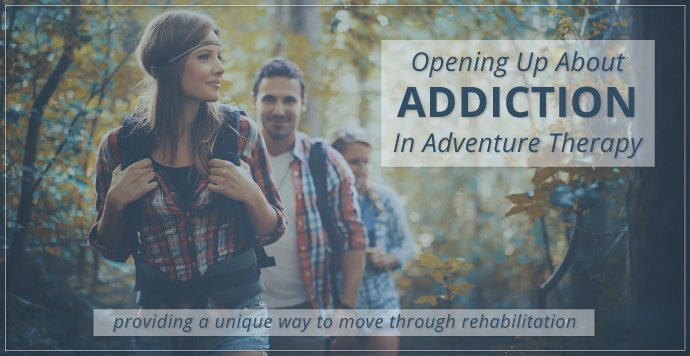The skills you learn in wilderness activities for addiction treatment are designed to give you the personal strength and focus that you need to beat addiction for good. However, you can’t approach adventure therapy half-heartedly or with a closed mind. It must be fully embraced to be effective. That’s also why you must open up about your addiction. Openly discussing your addiction, its impact on your life, and the ways in which you want to move forward can help give you the strength to not only finish your therapy but to create a perspective that you would have otherwise lacked.
At Texas Recovery Center, our adventure and wilderness therapy program in Texas provides an unorthodox approach to addiction treatment. Our team recognizes that wilderness activities for addiction treatment are ideal for people who are ready to challenge themselves in recovery. Learn more about our wilderness counseling program in Texas or our experiential therapy program in Texas by calling 844.230.5931 or filling out our online form.
Adjusting To Adventure Therapy
Before opening up about your addiction, you need to get settled in with the unique demands of adventure therapy. Even if you’ve been through traditional rehab treatment, you’re not really prepared for what you will experience. As a result, it’s better to spend the first few days understanding the curriculum of events, adjusting to your new and arduous schedule, and getting used to everything. [inline_cta_one]
For example, you might find yourself waking up with the sun as it rises every morning. This new early morning schedule will take a few days to get used to and won’t put you in the best mood for being open about your addiction struggles. You’ll also be experiencing physically challenging activities, such as:
- Hiking
- Mountain climbing
- Swimming
This will test your endurance for a few days and leave you with little energy to exercise. Combine that with any withdrawal treatment you might be undergoing, and you will be challenged to adapt very quickly.
Don’t try to open up too emotionally until you’ve healed a little physically. The early stages of adventure therapy are about repairing your body while undergoing physical health treatments, including dietary therapy, designed to get you back into better shape. Typically, you’re going to want to take the first three or four days to adapt in this way.
However, you can begin seeking an open and honest dialogue sooner or later, depending on your own personal needs. Don’t wait too long, though, or you might miss the opportunity to be fully open about your addiction and express the emotionally complex ways it has influenced you.
Settling in with Your Group
After you’ve adapted to the rigors of adventure therapy, you can start settling in with your group and get used to everyone’s unique personalities. Everyone will have their own story to tell, so begin chatting with people and getting to know who they are and why they came to adventure therapy. You don’t necessarily have to pry or be asking too many questions in these early stages, but simply begin to understand the basics of personality with each member of your group.
At the same time, your fellow adventurers should also be approaching you in a similar way. Open up to them as much as you feel comfortable, but feel free to hold back any serious information until you’re more comfortable with them. Opening up too soon can make you feel exposed and vulnerable. You may also open up to somebody whom you later find you either don’t trust or have a hard time getting along with as a person. While nobody in rehab is likely to judge you harshly or use information against you, it’s best to keep your hand pretty close to your chest to avoid the possibility. Trust us when we say that you’ll get the chance to really know people during adventure therapy and find out who you get along with the best.
Of course, you should also try to get along with everybody you can while in therapy and keep a positive mindset, but don’t feel the need to open up to everyone all at once. What you’ll find when performing the various activities inherent in adventure therapy is that people will reveal much of their nature. For example, a person who is easily frightened may struggle with mountain climbing, while a person with a giving nature will be drawn to helping them through their fear. Try to identify people with whom you think your personality will nicely pair and keep near to them.
Finding Your Support Group
By paying special attention to people during your adventure therapy activities, you can begin building your support group. A support group is made up of like-minded people who get along well together and who care about each other. During your treatment, you will instinctively get along with certain people better than others and vice versa. You’ll quickly build a friendship group that you spend time with regularly. Think of them as your support group and work to build a real relationship with them. Begin talking about difficult aspects of your life and asking about theirs. As you get to know each other, you’ll start understanding where the other person is coming from and vice versa.
You might discover, for example, that they struggle with alcohol due to an inferiority complex generated by a demanding father. Or you might find they are afraid of snakes and have been anxious for the whole trip as a result. Knowing these personal things helps put you in a position to reach out to that person, assist them on their journey, and open up to them about your own problems, including your addiction. If a person starts opening up to you, you should reciprocate, or they’ll feel uncomfortable. You should avoid the kind of intensely personal discussion that would be inappropriate in the larger group. It’s not that you can’t be friendly or discuss important matters with everyone, but that more private ones should be left to a discussion with counselors involved in your treatment.
Opening Up When the Time Is Right
When you’ve built up a support group of about four or five people, it’s time to be approachable and discuss your addiction in greater depth. Try to pick a time that is right for you and the dynamics of your group. For example, avoid opening up when somebody else is in the middle of discussing their addiction or currently dealing with cravings or other related problems. Instead, you should wait until the group is alone, such as when gathering wood or something else that separates your small circle from the other groups, and wait until everyone is comfortable and open to discussion. Then you need to discuss your addiction and open up about it as much as possible.
Try to cover every aspect of it, including:
- The substance you used
- The length of your addiction
- Reasons why you used that substance
- Psychological and physical health problems that may have contributed
- Moments when the addiction turned worse
- Emotionally difficult situations from which you’re still recovering
- Relapse triggers that you fear you might possess
- Reactions from friends and family members
- Any other personal information you find relevant
After holding in all this information for so long, you might find that it pours out of you like a mountain stream. You might end up breaking down when you’re finished and crying. The great thing about this is that you’ll have purged much of your emotional burden and that you’ll be surrounded by people who care about you and who want you to succeed. You won’t be crying alone in an empty room but on the shoulders of loved ones who truly understand your situation. You’ll also be immersed in the wild, an environment that naturally promotes relaxation and emotional strength. After you’ve broken through and opened up in this way, you can focus on enjoying the company of your new friends as you succeed in an exciting adventure like no other.
Explore Wilderness Activities for Addiction Treatment at Texas Recovery Center
As you can see, opening up about addiction in adventure therapy provides a unique way to move through the rigors of rehabilitation. It will bring you close to an incredible group of supportive friends and give you a platform for your continuing recovery. So don’t be afraid to take the plunge into adventure therapy by reaching out to us at Texas Recovery Center.
Contact us today online or at 844.230.5931, and our experts can help set you up with an adventure therapy treatment that can assist you in regaining the life of sobriety you so desperately deserve. They’ve been in the same situation, and they know how difficult it can be to open up and reach out for help. However, they’re here to walk you through the most challenging part of recovery and get you back on track.












